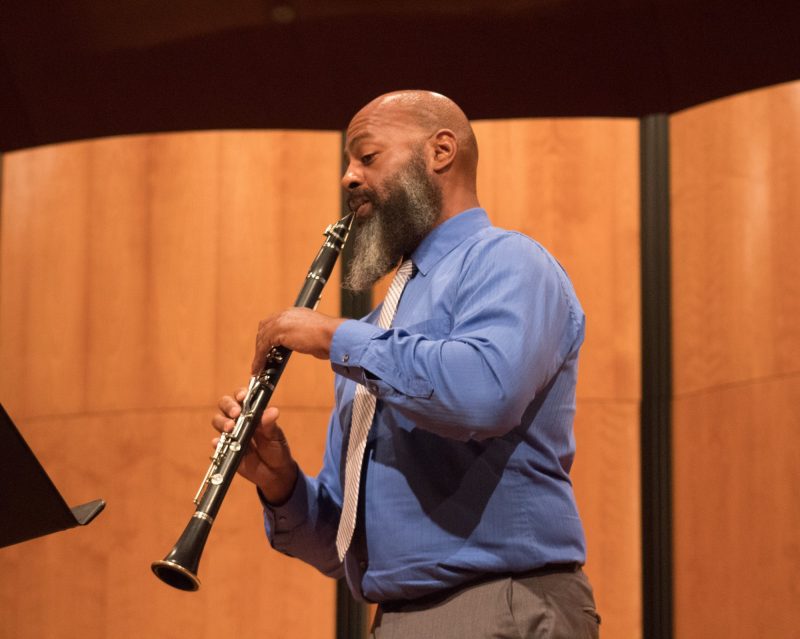Trinity University’s department of music brought both faculty and guest performers to Ruth Taylor Recital Hall for this past Sunday’s Chamber Recital. The concentrated group of artists included guests Lydia Beasley, soprano vocalist, and clarinetist Gary Fair along with music faculty members Joseph Kneer, violinist, and pianist Zachary Ridgway.
Although this was a small group of performers, they quickly caught my attention. I was not very familiar with each of the songs listed on the program, but I left the recital hall intrigued by the way in which each of the chosen music pieces was represented and captured by the artists.
I had the impression that the performers were very in tune with the audience. Before each song performance, one of the musicians gave the audience a brief introduction to it, allowing us to focus in on the emotion portrayed in each piece and providing relevant background information on the composers.
The recital started off with “Sicilienne and Rigaudon,” composed by Fritz Kreisler. This piece had a magnetic charm to it, and I enjoyed the back-and-forth between the piano and violin sections as it moved flexibly through the song’s variations on motifs.
After this song came Wolfgang Amadeus Mozart’s “Sonata in E Minor, K. 304.” This piece was divided into two parts and explored a period of mourning in the composer’s life after the death of his mother. The musicians were able to powerfully portray the emotion within this piece, which went through sudden spells of grief with a steady violin section followed by startling pangs of the piano. The piece started off in the slower allegro style, and moved along carefully before progressing to a more frenzied ending.
“Der Hirt auf dem Felsen, D. 965” (trans. “The Shepherd on the Rock”) by Franz Schubert was performed skillfully with an especially affecting performance by Soprano Lydia Beasley. The song’s lyrics — focused on longing and misery — paired well with the clarinet, which seemed at times to give off an echo and cry out in response to the sublime imagery of the text in which a mountain shepherd gazes into a valley.
An especially compelling composition by Alexander Scriabin, “Nocturne in Db, Op. 9 No. 2”, was performed after the show’s intermission. In his introduction, pianist Zachary Ridgway let us know that this song was a favorite of his, and his enthusiasm for it showed in his performance. This piece, composed by Scriabin after facing the loss of his ability to use his right hand, was written to be played by the left hand only. The piano went through a journey of reflection throughout the song, following along a thoughtful, balanced progression with points of contrast during sections that went into a darker, lower pitch.
The final piece, “Vier Letzen Lieder” by Richard Strauss (trans. “Four Last Songs”), was played in a continuous, 24-minute flow by the performers, and featured lyrics based on poems by Hermann Hesse and Joseph von Eichendorff. I was pulled along by the narrative sequence of these songs, and felt that each told a unique, evocative story with the piano accompaniment complimenting the emotional delivery of the lyrics.
As a venue, The Ruth Taylor Recital Hall was well-suited to the energy of the performances. The few artists on stage at a given time contributed to the warm and close atmosphere of the recital. The audience seemed to include a decent variety of students, educators and the public. The inviting character of the venue allowed us to focus our attention and lend our ears to the performers.
The music department presented an impressive program of performances for this chamber recital, and it was captivating to watch the versatility and collaboration between the faculty and guest artists. Each performance was distinct and gave the audience the opportunity to meditate on what we had just heard.
For a list of upcoming events in Trinity’s music department, visit trinity.edu/music.







